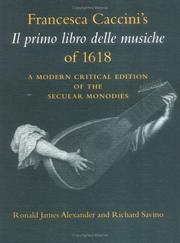| Listing 1 - 2 of 2 |
Sort by
|

ISBN: 1282072161 9786612072161 0253110092 9780253110091 0253211395 9781282072169 6612072164 Year: 2004 Publisher: Bloomington, Ind. Indiana University Press
Abstract | Keywords | Export | Availability | Bookmark
 Loading...
Loading...Choose an application
- Reference Manager
- EndNote
- RefWorks (Direct export to RefWorks)
Francesca Caccini (1587--ca.1640) was an accomplished composer, singer, and instrumentalist in the tradition of the Florentine Camerata. Her 1618 volume Il primo libro delle musiche was dedicated to her patron the Cardinal de' Medici (1596--1666).This modern critical edition presents 17 secular monodies for one and two voices with figured bass accompaniment from this landmark collection. The book includes text translations, biographical and stylistic essays, recommendations on performance practi
Solo cantatas, Secular. --- Vocal duets with continuo. --- Songs with continuo. --- Cantatas, Secular --- Songs --- Songs, Italian. --- Caccini, Francesca, --- Italian songs --- Caccini, Françoise, --- Cecchina, --- La Cecchina, --- Malaspina, Francesca Signorini-, --- Raffaelli, Francesca, --- Signorini, Francesca, --- Signorini-Malaspina, Francesca,
Book
ISBN: 9780226132129 0226132129 9780226132136 0226132137 022633810X Year: 2009 Publisher: Chicago The University of Chicago Press
Abstract | Keywords | Export | Availability | Bookmark
 Loading...
Loading...Choose an application
- Reference Manager
- EndNote
- RefWorks (Direct export to RefWorks)
A contemporary of Shakespeare and Monteverdi, and a colleague of Galileo and Artemisia Gentileschi at the Medici court, Francesca Caccini was a dominant musical figure there for thirty years. Dazzling listeners with the transformative power of her performances and the sparkling wit of the music she composed for more than a dozen court theatricals, Caccini is best remembered today as the first woman to have composed opera. Francesca Caccini at the Medici Court reveals for the first time how this multitalented composer established a fully professional musical career at a time when virtually no other women were able to achieve comparable success. Suzanne G. Cusick argues that Caccini's career depended on the usefulness of her talents to the political agenda of Grand Duchess Christine de Lorraine, Tuscany's de facto regent from 1606 to 1636. Drawing on Classical and feminist theory, Cusick shows how the music Caccini made for the Medici court sustained the culture that enabled Christine's power, thereby also supporting the sexual and political aims of its women. In bringing Caccini's surprising story so vividly to life, Cusick ultimately illuminates how music making functioned in early modern Italy as a significant medium for the circulation of power.
Women composers --- Women singers --- Feminism and music --- Music --- Compositrices --- Chanteuses --- Féminisme et musique --- Musique --- Biography --- History and criticism. --- Biographies --- Histoire et critique --- Caccini, Francesca, --- Medici, House of. --- Florence (Italy) --- Florence (Italie) --- Social life and customs. --- Moeurs et coutumes --- Caccini, Francesca --- anno 1600-1699 --- Italy --- Music and feminism --- Composers, Women --- Women as composers --- Composers --- Women musicians --- Art music --- Art music, Western --- Classical music --- Musical compositions --- Musical works --- Serious music --- Western art music --- Western music (Western countries) --- History and criticism --- Caccini, Françoise, --- Cecchina, --- La Cecchina, --- Malaspina, Francesca Signorini-, --- Raffaelli, Francesca, --- Signorini, Francesca, --- Signorini-Malaspina, Francesca, --- Florent︠s︡ii︠a︡ (Italy) --- Firenze (Italy) --- Florencia (Italy) --- Florença (Italy) --- Florenz (Italy) --- Florentia (Italy) --- Forence (Tuscany) --- Florence (Tuscany) --- Féminisme et musique --- Histoire et critique. --- Musicians --- Book
| Listing 1 - 2 of 2 |
Sort by
|

 Search
Search Feedback
Feedback About UniCat
About UniCat  Help
Help News
News